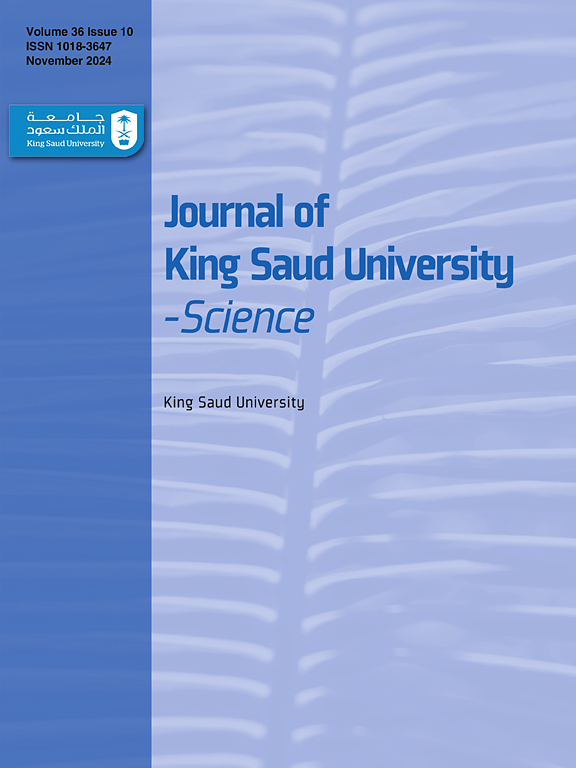Role of TRAF1 gene polymorphisms in susceptibility to Acute Lymphoblastic Leukemia in Saudi patients
IF 3.6
3区 综合性期刊
Q1 MULTIDISCIPLINARY SCIENCES
引用次数: 0
Abstract
Acute Lymphoblastic Leukemia (ALL) is a genetic malignancy characterized by the uncontrolled proliferation of hematopoietic precursor cells and evasion of immune surveillance. This study investigates the association between TRAF1 gene polymorphisms and the risk of developing ALL. Understanding the role of single nucleotide polymorphisms (SNPs) in the TRAF1 gene, which has been previously implicated in various immune-related disorders, may provide valuable insights into the molecular mechanisms of ALL and help identify potential therapeutic targets. A total of 265 subjects were recruited for this study, comprising 150 ALL patients and 115 healthy controls. Genotyping was performed using TaqMan PCR, focusing on four TRAF1 SNPs: rs2239657G/A, rs2416804G/C, rs7021049G/T, and rs3761847G/A. The minor allele frequencies and genotype distributions were compared between groups, with relative risks and statistical differences evaluated. Additionally, TRAF1 mRNA expression levels were assessed in both ALL patients and healthy individuals using qRT-PCR. The results demonstrated a significant association between the TRAF1 rs2239657G/A polymorphism and an increased risk of ALL, while the rs2416804G/C polymorphism was associated with a significantly reduced risk. Notably, TRAF1 was overexpressed in ALL patients, indicating its potential role in the pathogenesis of ALL. This overexpression suggests that TRAF1 may contribute to the interaction between inflammation and oncogenesis, providing new insights into the disease’s progression and highlighting TRAF1 as a possible biomarker for therapeutic intervention.
TRAF1基因多态性在沙特急性淋巴细胞白血病易感性中的作用
急性淋巴细胞白血病(Acute Lymphoblastic Leukemia, ALL)是一种遗传性恶性肿瘤,其特征是造血前体细胞不受控制的增殖和逃避免疫监测。本研究探讨TRAF1基因多态性与ALL发病风险之间的关系。了解TRAF1基因中单核苷酸多态性(snp)的作用,可能为了解ALL的分子机制提供有价值的见解,并有助于确定潜在的治疗靶点。TRAF1基因先前与各种免疫相关疾病有关。本研究共招募了265名受试者,其中包括150名ALL患者和115名健康对照。采用TaqMan PCR进行基因分型,重点检测4个TRAF1 snp: rs2239657G/A、rs2416804G/C、rs7021049G/T和rs3761847G/A。比较各组间小等位基因频率和基因型分布,评估相对风险和统计学差异。此外,使用qRT-PCR评估ALL患者和健康个体的TRAF1 mRNA表达水平。结果显示TRAF1 rs2239657G/ a多态性与ALL风险增加之间存在显著关联,而rs2416804G/C多态性与ALL风险显著降低相关。值得注意的是,TRAF1在ALL患者中过表达,表明其在ALL发病机制中的潜在作用。这种过表达表明TRAF1可能有助于炎症和肿瘤发生之间的相互作用,为疾病的进展提供了新的见解,并突出了TRAF1作为治疗干预的可能生物标志物。
本文章由计算机程序翻译,如有差异,请以英文原文为准。
求助全文
约1分钟内获得全文
求助全文
来源期刊

Journal of King Saud University - Science
Multidisciplinary-Multidisciplinary
CiteScore
7.20
自引率
2.60%
发文量
642
审稿时长
49 days
期刊介绍:
Journal of King Saud University – Science is an official refereed publication of King Saud University and the publishing services is provided by Elsevier. It publishes peer-reviewed research articles in the fields of physics, astronomy, mathematics, statistics, chemistry, biochemistry, earth sciences, life and environmental sciences on the basis of scientific originality and interdisciplinary interest. It is devoted primarily to research papers but short communications, reviews and book reviews are also included. The editorial board and associated editors, composed of prominent scientists from around the world, are representative of the disciplines covered by the journal.
 求助内容:
求助内容: 应助结果提醒方式:
应助结果提醒方式:


